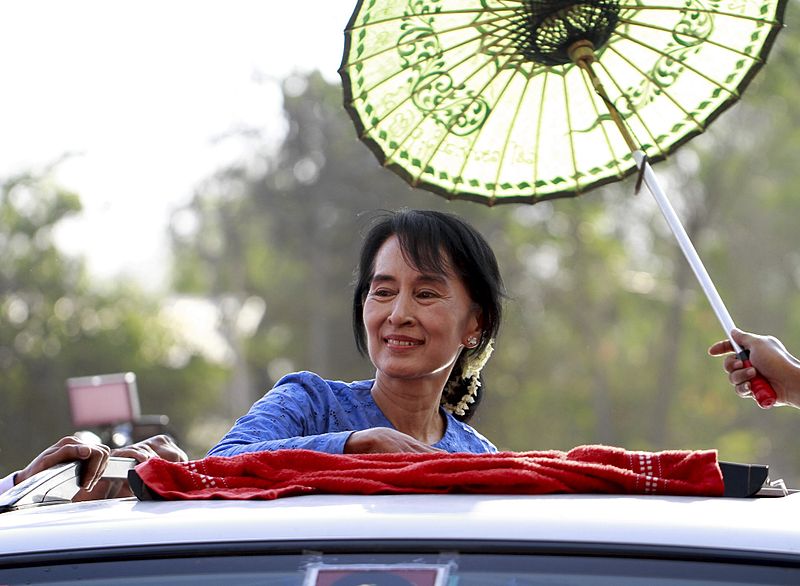Guest post by Hilary Matfess, Robert U. Nagel, and Meredith Loken.
On January 25th, President Donald Trump announced the temporary end of the longest government shutdown in US history. He used this Rose Garden speech to make his case for funding a wall on the southern border. When his teleprompter signalled to “Talk about Human Trafficking,” Trump asserted, “Women [coming across the border] are tied up. They’re bound. Duct tape put around their faces, around their mouths. In many cases, they can’t even breathe. They’re put in the backs of cars or vans or truck.” This claim is unsubstantiated: earlier this month, Border Patrol sent an internal email asking for “any information” regarding these claims after the Washington Post questioned their veracity.
This description of human trafficking mischaracterizes how these networks function, but it is also part of a long history of the US emphasizing—and often exaggerating—women’s unique need for protection to advance political and national security agendas.
There is a well-documented pattern of gendered violence along the US-Mexico border
Trump’s rhetoric obscures and mischaracterizes patterns of gendered violence committed along the border. Many migrant women report violence perpetrated by Border Patrol, other government officials, and civilians along their route. Three undocumented women reported that Border Patrol agent Esteban Manzanares brutally raped and tortured them in 2014. One, a 14-year old from Honduras, recalled that he tied her to a tree and duct taped her mouth.
In 2018, The Intercept obtained records of 1,124 complaints of sexual and physical abuse in immigration detention, half of which were filed against Immigration Customs and Enforcement (ICE) personnel. The United Nations, Amnesty International, and public health organizations also estimate high rates of sexual violence perpetrated by fellow travelers, coyotes, and government personnel during migrant journeys.
Despite substantial evidence of this type of violence and abuse, the administration is silent and publicly resistant to reform. Instead, Trump’s graphic language continues a pattern of sexist and racist notions about women’s vulnerability and white men’s role as protectors.
A political tradition
Trump’s speech is not the first time we’ve seen US politicians use this sort of rhetoric to justify violence and national security measures. These narratives emphasize saviorship as justification for militarization: as scholar Gayatri Chakravorty Spivak famously contends, “white men are saving brown women from brown men.”
The American invasion of Afghanistan was justified in part by moral claims about the status of Afghan women. In his 2002 State of the Union address President Bush declared, “The last time we met in this chamber, the mothers and daughters of Afghanistan were captives in their own homes, forbidden from working or going to school. Today women are free, and are part of Afghanistan’s new government.”
Similarly, both Bush administrations relied on narratives of protecting women in justifying wars against Iraq. The professed protection of women served to humanize state violence. More recently, the US’s selective focus on sexual violence committed by ISIS, compared with other abuses, justified intervention based on “the impulse to ‘save’ Syrian and Iraqi women.”
The United States is not alone in this endeavor: our research shows how governments worldwide invoke gendered protection norms to justify national security efforts. In Sri Lanka, the government used a small number of sexual violence prosecutions to draw international praise and garner political legitimacy among key domestic audiences while ignoring other mass human rights abuses. Additionally, envoking the symbolism of women’s victimhood enabled the government to legitimize further violence in the conflict with the separatist Liberation Tigers of Tamil Eelam.
In Nigeria, Boko Haram’s abduction of the Chibok girls reduced a complex conflict to debates about saviorship and responsibility. The attention given to the abducted girls gave leverage to the group, as it allowed the insurgents to use the girls as bargaining chips. Negotiations to release the Chibok girls have resulted in the release of imprisoned commanders and sizeable payments to the insurgent.
Globally, states are concerned that rebel-perpetrated sexual violence exposes their inability to protect women. Constituents frequently choose leaders based on gendered expectations of protection. That is why governments are more likely to agree to mediation in an effort to save face, when reports of rebel sexual violence publicly demonstrate their failure to protect women.
Dangerous implications
Although women ostensibly benefit from protection, this gendered protection norm has dangerous implications. Men assert control (often violently) over women’s lives in the name of protecting them. Establishing moral authority for violence primarily through protection narratives risks entrenching women’s subordinate social position and encouraging their dependence on the state.
Using female purity and victimhood as pretexts for violence in the name of national security limits women’s ability to mobilize for their own interests and entrenches stereotypes that can restrict women’s opportunities. Infantilizing women diminishes their agency, as evidenced by the fact that governments often group together women and children as vulnerable dependents. Furthermore, in making women particularly emotionally resonant targets, these appeals may put women at greater risk of victimization.
Given the US’s history with these narratives and the effects of this administration’s policies on women’s rights both domestically and internationally, Trump’s unsubstantiated claims are unsurprising. Still, we should be wary of how this language is casually used to justify state violence and how it reinforces sexist and racist militarization of the US immigration policies.
Hilary Matfess is a PhD Student in Yale University’s Political Science Department. Robert U. Nagel is a PhD Candidate at the School of Politics and International Relations at the University of Kent. Meredith Loken is Assistant Professor of Political Science at the University of Massachusetts-Amherst.






